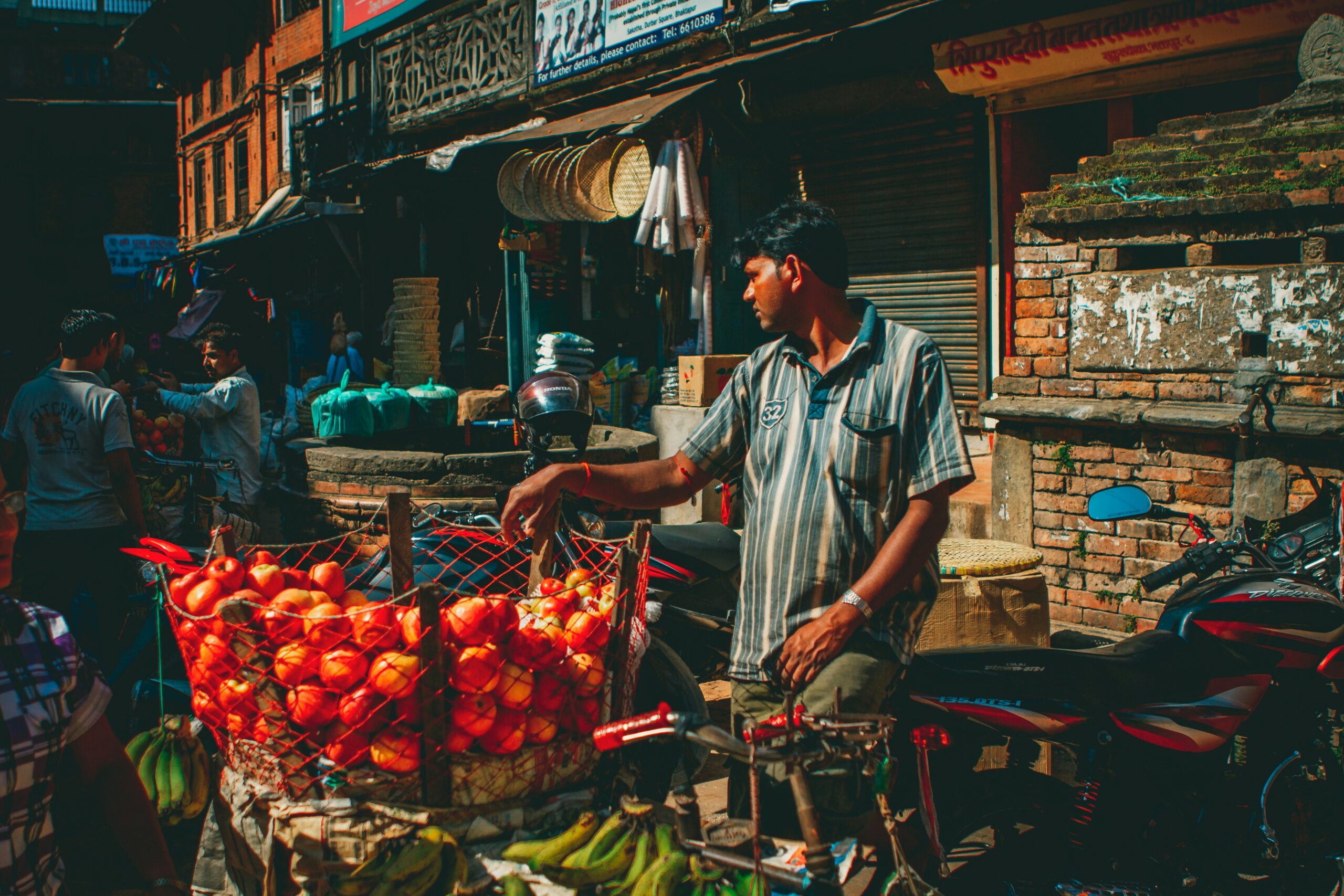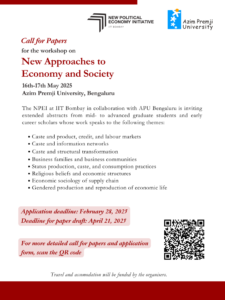New Approaches to Economy and Society Workshop, 2025

The New Political Economy Initiative at Indian Institute of Technology Bombay, in collaboration with Azim Premji University Bengaluru, is organising the second edition of the 2-day workshop on New Approaches to Economy & Society on 16th & 17th May 2025 at APU’s Bengaluru campus. This workshop is the second edition of the May 2024 convening that was hosted at and in collaboration with the Indian Institute of Technology Mandi. Read the detailed call for more information.
Call for Papers:
The Indian economy is understood to have experienced incomplete structural transformation or premature deindustrialisation (Rodrik, 2016) marked by services-led growth and a swelling informal sector (Ghose, 2021; Basole, 2022). Alternatively it is characterised as formal subsumption to capital (Rao and Vakulabharanam, 2018), the presence of a large need economy (Sanyal, 2014), or an economy dominated by petty and commercial or merchant as opposed to industrial capital (Harriss-White, 2018). Within this larger macroeconomic “given,” caste, gender, religion, ethnicity etc. are seen to refract the impact of economic change and public policy in economics literature. In sociology, social change captured through caste studies or village studies often treats the economic landscape as pre-existing or outside the sphere of inquiry. There is little attempt to link the two spheres of analysis in either disciplines i.e. explore the ways in which social relations, themselves dynamic, impact or shape the very contours of the economic landscape at macro, meso, and micro scales. In other words, how do social relations structure economic processes, outcomes, and trajectories?
If caste relations are to be understood as a resource or a network (Mosse, 2018), under what conditions do such networks become heterogenous, and when do they remain hostile to the entry of capital from other jatis, gotras, or kin-groups (Upadhya, 2023)? How do caste relations manifest in and shape contemporary systems of credit? What are the implications of the caste-mapping of capital for the structuring of labour markets and costs? How do these shape procurement and distribution chains? What are the consequences for profitability, entry of capital, and competition? What are the conditions under which the caste- and kinship- nature of capital is growth inducing, and when does it prohibit expansion? What is the sociology of the transformation (or lack thereof) of agrarian capital and merchant capital into industrial capital (Chari, 2004; Damodaran, 2018; Cowan, 2018)? Under what conditions does regional caste-rooted capital transcend or expand its province (Kalaiyarasan and Vijayabaskar, 2021; Benbabaali, 2018)?
What are the implications of our caste-graded sociality on spending decisions? Within the household-enterprise or the business family, social status is a productive resource that requires maintenance and improvement. Decisions of consumption spending are deeply tied to status and cannot be disentangled from investment. What can be said about changing consumption practices across social groups and regions (Aslany, 2020; Khamis et al., 2012)? What does this tell us about saving and investment behaviours? How does religious morality interact with and structure the economy (Rahman, 2022)?
Status is equally produced by gender relations in and beyond the household. A sizeable economics literature employs the framework of social reproduction theory to make sense of women’s time-poverty (Mukherjee, 2017), contributions of unpaid work in the reproduction of household labour and enterprise (Rao et al., 2024; Naidu and Ossome, 2016) and female labour force participation in India (Naidu and Rao, 2018). Others like Eswaran et al. (2013) attribute the decline in female labour force participation to caste-based status production. Ethnographic methods have the capacity to yield insights on the processes and mechanisms underlying these economic phenomena (as in Ponniah (2017) and Harriss-White (2003)).
The New Political Economy Initiative at Indian Institute of Technology Bombay, in collaboration with Azim Premji University, Bangalore, is organising the second edition of the 2-day workshop on New Approaches to Economy & Society on 16th & 17th May 2025 at Azim Premji University, Bengaluru. This workshop is the second edition of the May 2024 convening that was hosted in collaboration with Surya Prakash Upadhyay and Debdulal Saha at Indian Institute of Technology Mandi.
For the second edition, we want to bring together mid- to advanced-graduate students and early career scholars whose work speaks to the following themes:
- Caste and product, credit, and labour markets
- Caste and information networks
- Caste and structural transformation
- Business families and business communities
- Status production, caste, and consumption practices
- Religious beliefs and economic structures
- Economic sociology of supply chain
- Gendered production and reproduction of economic life
We are especially interested in submissions that employ ethnographic methods to unpack economic phenomena, but are open to works that are primarily quantitative or theoretical. Participants will be paired with respondents who are experienced in the field to provide constructive feedback. Applications that speak most closely to the workshop theme will be given preference and will be expected to submit a completed workshop draft by April 21, 2025.
To apply, please submit an extended abstract of 800–1000 words that details your research question, methods, and preliminary findings through the application form.
Domestic travel and accommodation for shortlisted participants will be funded by the organisers.
Important dates
- 28th February, 2025: Deadline to submit the extended abstract
- 20th March, 2025: Announcement of shortlisted participants:
- 21st April, 2025: Deadline to submit draft paper for the workshop
- 16th-17th May, 2025: Workshop at APU, Bangalore
Convenors for the 2025 edition
Srishti Yadav & Tony Kurian, Azim Premji University
